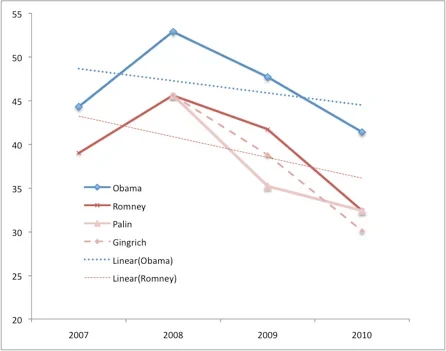The shine has come off Barack Obama.
His approval ratings are falling, fewer people would vote for him today than voted for him in 2008, and pundits interpret all of this as a bad sign for Democrats in Tuesday’s midterm elections.
But, the shine is coming off the Republicans, too - and in equal magnitudes. It turns out, that in the worse economic climate since the Depression, American voters are disillusioned with candidates from both parties. And, if anything, the deflation of potential Republican presidential candidates is ever-so-slightly more precipitous than for President Obama.
Here’s the evidence: Beginning in 2007, YouGov/Polimetrix, began asking likely voters who they would vote for if the presidential election were a contest between any one of 3 Democrats (Edwards, Clinton, or Obama) and any one of four Republicans (Huckabee, McCain, Romney, Giuliani). These hypothetical head-to-head match-ups were asked in the Cooperative Campaign Analysis Project (CCAP), run out of UCLA and Stanford University (for a complete analysis of the matchups click here) In December of 2007, long before his knock-out battle for the nomination with Hillary Clinton, and long before it was known that the presidential contest would be between Obama and McCain, 43.8 percent of likely voters told us they would vote for Obama in this match-up and 40.1 percent chose McCain. Similarly, 44.3 percent of likely voters told us they would vote for Obama in a 2008 general election match-up between he and Mitt Romney, for whom 39 percent said they would vote in this scenario.
Fast forward one year later. In November of 2008, after a third economic quarter so disastrous that the Republican nominee, John McCain, suspended his campaign to deal with the crisis, Obama received 52.9 percent of the vote (to McCain’s 45.6). Because undecided voters are essentially forced to make a choice in the election, both candidates’ vote shares are higher than in the hypothetical match-ups. If we look only at Obama’s share of the two-party vote against McCain’s, going back to December 2007, the Democrat received 52.2 percent to McCain’s 47.8 percent. Ultimately, people did a pretty good job in December of figuring out who they would vote for one year later if the contest was a choice between Obama and McCain. The estimate is off by less than a point!
But that’s another topic.
Right now, I want to fast forward another year --- to November 2009. We re-interviewed some of the same people one year after the election and asked them about hypothetical match-ups in 2012. The common Republican thread between 2007 and 2009 is Mitt Romney; but we also asked about Sarah Palin and Newt Gingrich. And here’s where things get interesting. Keeping undecided voters in the denominator, as we did for the 2007 calculation, Obama’s vote share in 2009 is actually higher than it was in 2007 --- probably some version of riding on his own coat tails explains this, if one can do that -- he won the presidency after all. But Romney’s share of the vote goes up, too, from 39 percent in 2007 to 41.7 percent in 2009. In 2009, the public is just feeling better about both party candidates. Romney also does the best against Obama among the three Republicans we asked about. Gingrich is a distant second with 38.8 percent of the vote and Palin comes in last with 35.2 percent against Obama in 2012.
Finally, one more year later. Just last week, we asked 1,000 people in another YouGov/Polimetrix survey these same hypothetical match-ups. With the Congressional elections only 2 weeks away, over 1 billion dollars spent on campaign advertising, and pundit after pundit predicting a Democratic demise in these elections, how unpopular is Obama in these hypothetical 2012 presidential contests?
The answer is surprising. The right question, it seems, is not how much popularity has Obama lost in voters’ minds, but has he lost more or less relative to all the others? In 2010, voters like everyone less than they did a year ago.
Obama still wins in contests between all three of the Republicans we asked about - Romney, Palin, and Gingrich. Against Romney, Obama’s loss in vote share from 2009 is seven points, from 48 to 41 percent --- so yes, Obama has lost votes this last year. But so, too, has everyone else. Romney’s share of the vote is down 10-points, from 42 to 32; and Gingrich’s dropped nine points, from 39 to 30. Palin loses the fewest votes, but she was starting from an already low baseline – 35.2 in 2009 to 32.4 in 2010.
Voters like all the candidates less than they did a year ago, not just Barack Obama.
And why shouldn’t they? Changes to the national economic situation have been slow, perhaps even undetectable to most voters; and, the 2012 election is a long way off. Better to withhold judgment right now and see what happens over the next year or so of Obama’s presidency. If jobs come back and the economy can grow Obama is likely to return to the White House for another term. These are simply the odds. Of the last 16 presidential elections, immediate changes in the nation’s growth rate predict the winner in 13 of the 16 cases, missing only three --- 1976, 1992, and 2000, two of which were extremely close.
Obama has his work cut out for him, but he’s still ahead. The interesting question is not whether he can he get his popularity back, but whether he can hold on to what he has.









